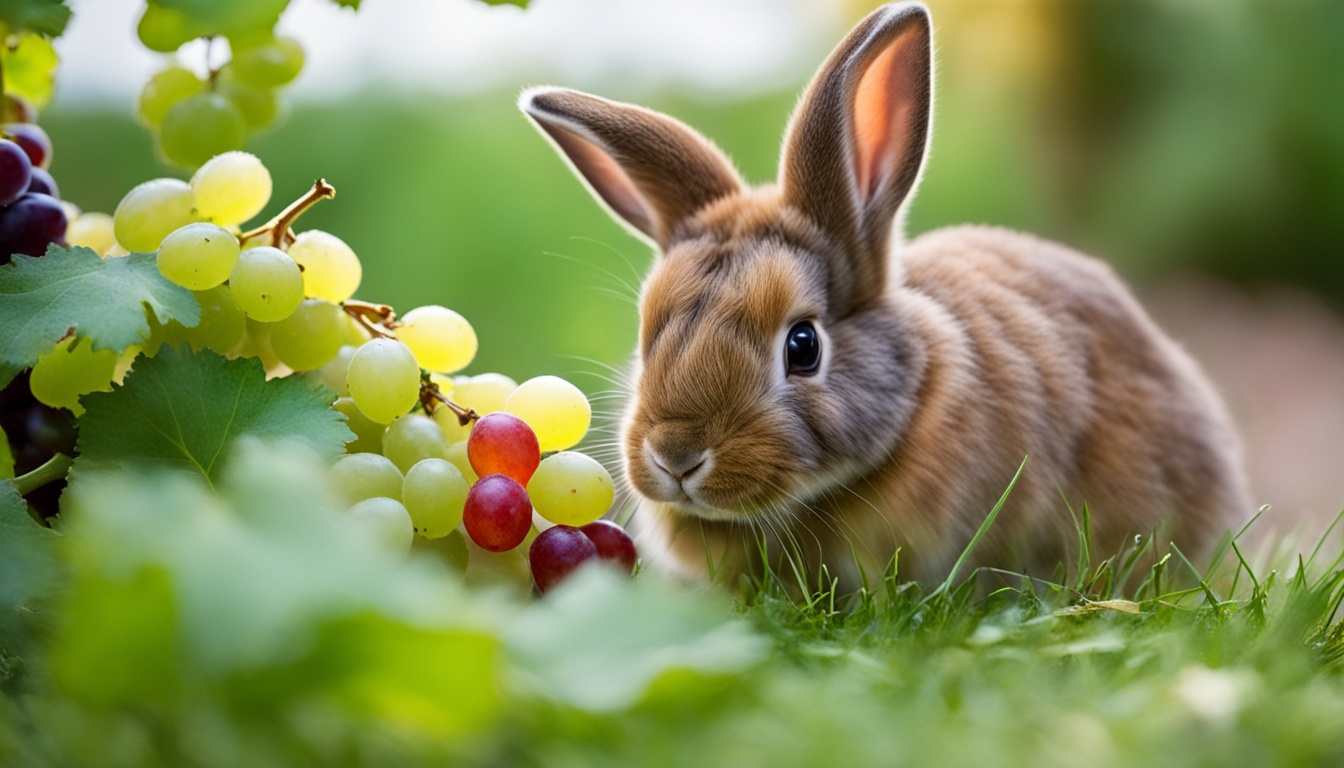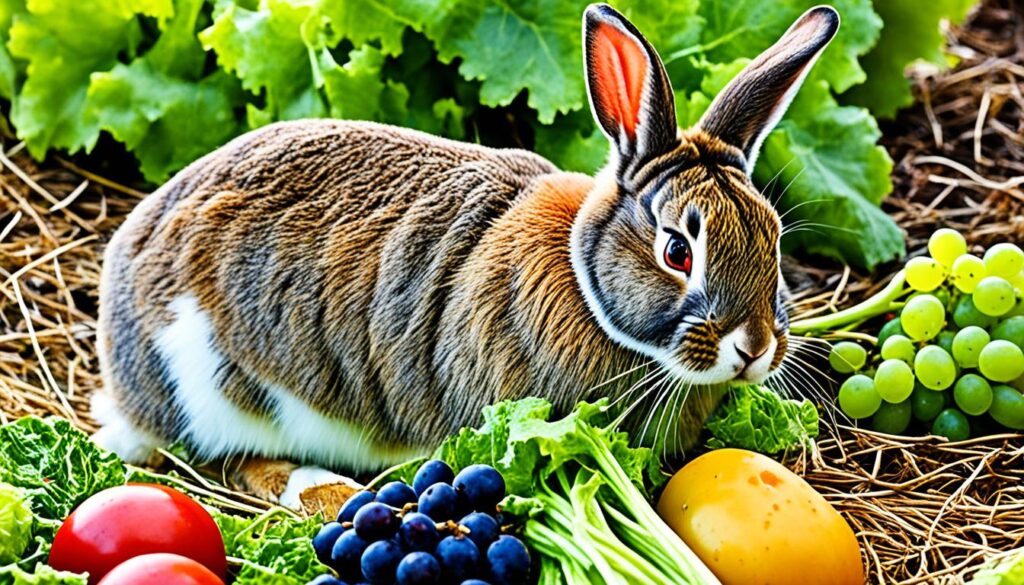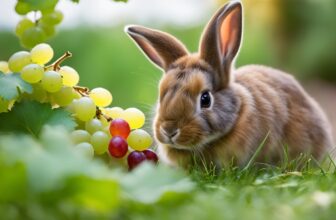Can Bunnies Have Grapes? Safe Bunny Snacks

As a dedicated pet parent, you may have wondered: Can my beloved bunny indulge in the delightful treat of grapes? The answer may surprise you. While grapes are not toxic to rabbits, they should be fed with caution and moderation. In this comprehensive guide, we’ll explore the potential benefits and risks of including grapes in your rabbit’s diet, ensuring your furry friend stays happy and healthy.
Key Takeaways
- Grapes can be a safe occasional treat for adult rabbits, but should be fed in moderation.
- Grapes are high in sugar, which can lead to digestive issues and weight gain if fed excessively.
- Grape seeds pose a choking hazard, so it’s best to offer seedless grapes.
- Baby rabbits should not be given grapes until their digestive system is fully developed.
- Proper portion control and a balanced diet are essential for your rabbit’s overall health and well-being.
Are Grapes Safe for Rabbits?
Exploring the Risks and Benefits
While grapes are not considered toxic to rabbits, they should be fed with caution. Grapes are high in natural sugars, which can pose some health risks if consumed in excess. Overindulging in grapes can lead to digestive issues like diarrhea, bloating, and even a life-threatening condition called gastrointestinal (GI) stasis in rabbits.
The high sugar content in grapes can also contribute to weight gain and potentially increase the risk of diabetes in rabbits. On the other hand, grapes do provide some beneficial nutrients, such as fiber, B vitamins, vitamin K, and antioxidants, which can support a rabbit’s overall health when fed in moderation.
It’s essential to understand the balance between the risks and benefits when considering whether to include grapes in a rabbit’s diet. Rabbits should be introduced to grapes gradually, and the portion size should be limited to 2-3 small grapes or one large grape, no more than 2-3 times a week. This approach helps ensure that rabbits can enjoy the occasional grape treat without experiencing any adverse effects.
It’s also important to note that baby rabbits and juvenile rabbits should generally avoid grapes due to their delicate digestive systems. Their bodies may not be equipped to handle the high sugar content of grapes, which could lead to more severe gastrointestinal problems.
In summary, while grapes can be a safe and occasional treat for adult rabbits, it’s crucial to feed them in moderation and with caution. Providing a varied and balanced diet with a focus on hay, vegetables, and a limited amount of safe fruits is the best approach to ensure your rabbit’s overall health and well-being.
Nutritional Value of Grapes for Rabbits
While grapes can provide some nutritional benefits for rabbits when fed in moderation, they should be considered a treat rather than a staple in a rabbit’s diet. Grapes contain fiber, which can aid digestion, as well as B vitamins and vitamin K, which support various bodily functions. They also have a high water content, which can help keep rabbits hydrated. Additionally, grapes are a good source of antioxidants, which can bolster the rabbit’s immune system.
However, the high sugar content in grapes means they should be fed with caution. Rabbits’ diets should primarily consist of hay, pellets, and leafy greens, as these provide the essential nutrients and fiber needed for their overall health and well-being. Grapes, while a tasty treat, should only be offered in moderation as part of a balanced diet.
| Nutrient | Amount per Cup of Grapes |
|---|---|
| Fiber | 5 grams |
| Protein | 1 gram |
| Carbohydrates | 5 grams |
| Calories | 104 |
| Fat | 0.2 grams |
| Copper | 3 milligrams |
| Manganese | 0.1 milligram |
| Vitamin B6 | 0.1 milligram |
| Riboflavin | 0.1 milligram |
| Vitamin K | 22 micrograms |
| Thiamine | 0.1 milligram |
While grapes can provide some beneficial nutrients, it’s important to remember that they should be fed to rabbits in moderation due to their high sugar content. Incorporating a variety of fresh, leafy greens and limited servings of fruits like grapes can help ensure a well-balanced rabbit diet.

Potential Risks of Feeding Grapes to Rabbits
While grapes may seem like a tempting treat for your furry bunny friend, it’s important to be aware of the potential risks associated with feeding them to rabbits. Rabbits have sensitive digestive systems, and the high sugar content in grapes can lead to a variety of health issues.
One of the primary concerns with feeding grapes to rabbits is the risk of digestive problems. Grapes are high in carbohydrates and can contribute to conditions like diarrhea, bloating, and even gastrointestinal (GI) stasis, a potentially life-threatening condition. Excessive consumption of grapes can result in dehydration, liver failure, and other serious health problems for your rabbit.
In addition to the sugar content, grapes also pose a choking hazard due to the presence of seeds. While seedless varieties are generally safer, it’s still essential to exercise caution and ensure that your rabbit does not inadvertently swallow any seeds or large pieces of the fruit.
Another potential risk associated with feeding grapes to rabbits is the impact on their weight and overall health. Grapes are high in carbohydrates, which can contribute to weight gain and increase the risk of diabetes in rabbits. Maintaining a balanced diet with the appropriate portions of hay, pellets, and fresh vegetables is crucial for your rabbit’s wellbeing.
It’s important to note that while grapes are not considered toxic to rabbits, they should be fed in moderation and as an occasional treat, rather than as a regular part of their diet. Proper portion control and monitoring your rabbit’s reaction to grapes are essential to ensure their safety and prevent any adverse health effects.
Toxic Foods to Avoid
In addition to the risks associated with grapes, there are several other foods that should be avoided when caring for your pet rabbit. These include:
- Avocado: Contains a compound called persin that can be toxic to rabbits.
- Chocolate: Contains theobromine and caffeine, which can be dangerous for rabbits.
- Fruit seeds and pits: Can contain cyanide, which is harmful to rabbits.
- Onions, leeks, and garlic: Can cause hemolytic anemia in rabbits.
- Meat, eggs, and dairy: Rabbits’ digestive systems are not equipped to process animal proteins effectively.
- Processed foods: High in carbohydrates and sugar, which can lead to digestive issues and obesity.
It’s crucial to always consult with your veterinarian to ensure that you are providing your rabbit with a safe and nutritious diet that caters to their specific needs.

“Rabbits are delicate creatures and require a specialized diet to maintain their health and well-being. It’s important to be mindful of the foods you provide and to prioritize their nutritional needs.”
Can Bunnies Have Grapes?
When it comes to feeding our beloved bunny friends, the question of whether they can safely indulge in grapes often arises. As responsible pet owners, it’s important to understand the potential risks and benefits of incorporating this fruit into a rabbit’s diet.
Adult rabbits can consume grapes in moderation as an occasional treat, but it’s generally not recommended to feed grapes to baby rabbits (bunnies). Bunnies have delicate digestive systems that are still developing, and the high sugar content in grapes can cause significant digestive issues, such as diarrhea, bloating, and even life-threatening conditions like gastrointestinal (GI) stasis. It’s best to wait until a rabbit is at least 12 weeks old before introducing grapes or other fruits as part of a balanced rabbit diet.
For adult pet bunnies, grapes can provide some beneficial bunny nutrition, such as a good source of vitamins C and K, potassium, and manganese. However, they should be fed in moderation to avoid the potential risks associated with excessive sugar intake. Seedless grapes are considered a safer option, as they eliminate the choking hazard posed by grape seeds.
It’s important to note that grapes contain compounds that can be toxic to rabbits, causing gastrointestinal distress and potential kidney damage. Additionally, the high sugar content in grapes can lead to digestive issues, obesity, and other health problems if not consumed in moderation.
To ensure the safety and well-being of your pet bunny, it’s recommended to limit a rabbit’s grape intake to a small amount, a few times per week, and to offer healthy snacks for bunnies like snap peas as an alternative treat. Providing a balanced diet with plenty of grass hay, fresh water, and occasional healthy treats can help keep your rabbit happy and healthy.
| Nutrient | Amount in Grapes | Potential Benefits for Rabbits |
|---|---|---|
| Vitamin C | 3.3 mg per 100g | Supports immune system and skin health |
| Vitamin K | 2.6 mcg per 100g | Promotes blood clotting and bone health |
| Potassium | 191 mg per 100g | Regulates fluid balance and muscle function |
| Manganese | 0.24 mg per 100g | Supports enzyme function and antioxidant defense |
In conclusion, while can bunnies have grapes is a valid question, the answer is that adult rabbits can enjoy grapes in moderation, but bunnies and young rabbits should avoid them due to their delicate digestive systems and the potential risks associated with the high sugar content. By providing a balanced diet and limited, supervised access to grapes, you can ensure your rabbit’s overall health and well-being.
Proper Ways to Feed Grapes to Your Rabbit
As pet owners, it’s natural to want to share our favorite treats with our furry companions. When it comes to rabbits, however, it’s crucial to be mindful of portion sizes and frequency when offering grapes as a snack. While grapes can provide some nutritional benefits, they should be fed to rabbits in moderation due to their high sugar content.
Portion Sizes and Frequency
If you decide to feed grapes to your adult rabbit, it’s important to do so with caution. Experts recommend cutting grapes in half for smaller rabbits and offering a whole grape for larger rabbits. The recommended frequency is to give your rabbit one to two grapes, two to three times per week as a treat. Avoid feeding dried grapes, as they contain even more concentrated sugar.
Remember, grapes should never make up a significant portion of a rabbit’s diet, which should primarily consist of hay, pellets, and leafy greens. Proper portion control and moderation are key to ensuring your rabbit’s health and safety when feeding grapes.
| Rabbit Size | Grape Portion | Feeding Frequency |
|---|---|---|
| Smaller Rabbits | Half a grape | 2-3 times per week |
| Larger Rabbits | 1 whole grape | 2-3 times per week |
Additionally, be sure to wash the grapes thoroughly and remove any seeds to prevent choking hazards. Grapes should be offered as an occasional treat, not a regular part of your rabbit’s diet.
By following these guidelines, you can safely and responsibly incorporate grapes into your rabbit’s treat routine, providing them with a tasty and nutritious snack while prioritizing their overall health and well-being.
Conclusion
In conclusion, adult rabbits can safely consume grapes in moderation as an occasional treat, but it’s important to be mindful of the potential risks. Grapes are not toxic to rabbits, but their high sugar content can lead to digestive issues and other health problems if fed in excess. Proper portion control, frequency, and precautions, such as removing seeds, are essential when incorporating grapes into a rabbit’s diet. Baby rabbits (bunnies) should not be given grapes until their digestive systems are more developed, typically around 12 weeks of age. By understanding the nutritional value and proper feeding guidelines for grapes, pet owners can provide their rabbits with a balanced and healthy diet that includes occasional grape treats.
While grapes can offer some nutritional benefits to rabbits, they should only complement and not replace the core components of a rabbit’s diet, which should primarily consist of hay, fresh vegetables, and a limited amount of pellets. Careful consideration of the quantity and frequency of grape feeding is crucial to ensure the overall well-being of pet bunnies. Consulting with a veterinarian is always recommended before introducing new foods to a rabbit’s diet to ensure their safety and optimal health.
Overall, the conclusion emphasizes the importance of moderation and caution when it comes to feeding grapes to rabbits. By following the guidelines and understanding the potential risks, pet owners can safely incorporate grapes as an occasional treat while maintaining a balanced and healthy diet for their beloved bunnies.







